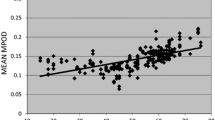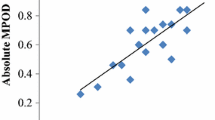Abstract
Purpose
To establish the normal macular pigment density (MPOD) in a healthy adult Australian sample using heterochromatic flicker photometry (HFP).
Methods
Macular pigment density was measured using heterochromatic flicker photometry in a total of 201 subjects ranging in age from 21 to 84 years with healthy macula. Fifty-seven of the healthy subjects also completed a food-frequency dietary questionnaire. Best-corrected visual acuity (BCVA) was measured using logMAR, chart and macular morphological profiles were assessed using high-resolution integrated Fourier-domain optical coherence tomography (OCT).
Results
The average MPOD value was 0.41 ± 0.20 (range 0.07–0.79). There was no statistically significant difference between values in the left and right eye, with good interocular agreement (0.41 vs 0.40, r = 0.893, p < 0.01). Age significantly predicted MPOD score (R 2 = 0.07, p < 0.05). A subgroup analysis of patients who completed the dietary questionnaire revealed a close correlation between higher diet scores and higher MPOD (r = 0.720 p = 0.031). There was no effect of smoking, gender, or iris colour on MPOD values. There was no significant correlation between BCVA, macular OCT profiles, and MPOD.
Conclusion
Given that MPOD values are potentially affected by geographical variation, we have determined a mean MPOD value for healthy subjects in a population south of the equator, providing a reference point for future studies on Caucasian samples.
Similar content being viewed by others
References
Loughman J, Akkali MC, Beatty S et al (2010) The relationship between macular pigment and visual performance. Vis Res 50:1249–1256
Bartlett H, Howells O, Eperjesi F (2010) The role of macular pigment assessment in clinical practice: a review. Clin Exp Optom 93:300–308
Nussbaum JJ, Pruett RC, Delori FC (1981) Historic perspectives. Macular yellow pigment. The first 200 years. Retina 1:296–310
Hogg RE, Ong EL, Chamberlain M et al (2012) Heritability of the spatial distribution and peak density of macular pigment: a classical twin study. Eye (Lond) 26:1217–1225
Snodderly DM, Mares JA, Wooten BR et al (2004) Macular pigment measurement by heterochromatic flicker photometry in older subjects: the carotenoids and age-related eye disease study. Invest Ophthalmol Vis Sci 45:531–538
Liew SHM (2005) Heritability of macular pigment: a twin study. Invest Ophthalmol Vis Sci 46:4430–4436
Hammond BR, Wooten BR, Snodderly DM (1998) Preservation of visual sensitivity of older subjects: association with macular pigment density. Invest Ophthalmol Vis Sci 39:397–406
Beatty S, Koh H-H, Phil M, Henson D, Boulton M (2000) The role of oxidative stress in the pathogenesis of age-related macular degeneration. Surv Ophthalmol 45:115–134
Wooten BR, Hammond BR (2002) Macular pigment: influences on visual acuity and visibility. Prog Retin Eye Res 21:225–240
Dawczynski J, Schweitzer D (2011) Objective measurement of macular optical density. Klin Monatsbl Augenheilkd 228:57–61
Howells O, Eperjesi F, Bartlett H (2011) Measuring macular pigment optical density in vivo: a review of techniques. Graefes Arch Clin Exp Ophthalmol 249:315–347
Hammond BR, Wooten BR, Snodderly DM (1997) Individual variations in the spatial profile of human macular pigment. J Opt Soc Am A 14:1187–1196
Ciulla TA, Curran-Celantano J, Cooper DA (2001) Macular pigment optical density in a midwestern sample. Ophthalmology 108:730–737
Raman R, Rajan R, Biswas S, Vaitheeswaran K, Sharma T (2010) Macular pigment optical density in a South Indian population. Invest Ophthalmol Vis Sci 52:7910–7916
Tang C, Yip H, Poon M, Yau W, Yap M (2004) Macular pigment optical density in young Chinese adults. Ophthalmic Physiol Opt 24:586–593
Hammond BR, Caruso-Avery M (2000) Macular pigment optical density in a Southwestern sample. Invest Ophthalmol Vis Sci 41:1492–1497
Connolly EE, Beatty S, Thurnham DI et al (2010) Augmentation of macular pigment following supplementation with all three macular carotenoids: an exploratory study. Curr Eye Res 35:335–351
Beatty S, Murray IJ, Henson DB, Carden D, Koh H, Boulton ME (2001) Macular pigment and risk for age-related macular degeneration in subjects from a Northern European population. Invest Ophthalmol Vis Sci 42:439–446
Bone RA, Landrum JT, Mayne ST, Gomez CM, Tibor SE, Twaroska EE (2001) Macular pigment in donor eyes with and without AMD: a case–control study. Invest Ophthalmol Vis Sci 42:235–240
Trieschmann M, Spital G, Lommatzsch A et al (2003) Macular pigment: quantitative analysis on autofluorescence images. Graefes Arch Clin Exp Ophthalmol 241:1006–1012
Ciulla TA, Hammond BR (2004) Macular pigment density and aging, assessed in the normal elderly and those with cataracts and age-related macular degeneration. Am J Ophthalmol 138:582–587
LaRowe TL, Mares JA, Snodderly DM, Klein ML, Wooten BR, Chappell R (2008) Macular pigment density and age-related maculopathy in the carotenoids in age-related eye disease study. Ophthalmology 115:876–883
van der Veen R, Berendschot TT, Hendrikse F, Carden D, Makridaki M, Murray IJ (2009) A new desktop instrument for measuring macular pigment optical density based on a novel technique for setting flicker thresholds. Ophthalmic Physiol Opt 29:127–137
Nolan JM, Stack J, O’Connell E, Beatty S (2007) The relationships between macular pigment optical density and its constituent carotenoids in diet and serum. Invest Ophthalmol Vis Sci 48:571–582
Gallaher KT, Mura M, Todd WA et al (2007) Estimation of macular pigment optical density in the elderly: test–retest variability and effect of optical blur in pseudophakic subjects. Vis Res 47:1253–1259
Murray IJ, Carden D, Makridaki M (2011) The repeatability of the MPS 9000 macular pigment screener. Br J Ophthalmol 95:431–432
Hagen S, Krebs I, Glittenberg C, Binder S (2010) Repeated measures of macular pigment optical density to test reproducibility of heterochromatic flicker photometry. Acta Ophthalmol 88:207–211
Neelam K (2005) Measurement of macular pigment: Raman spectroscopy versus heterochromatic flicker photometry. Invest Ophthalmol Vis Sci 46:1023–1032
Hammond BR, Fuld K (1992) Interocular differences in macular pigment density. Invest Ophthalmol Vis Sci 33:350–355
Mellerio J, Ahmadi-Lari S, van Kuijk F, Pauleikhoff D, Bird A, Marshall J (2002) A portable instrument for measuring macular pigment with central fixation. Curr Eye Res 25:37–47
van der Veen R, Ostendorf S, Hendrikse F, Berendschot TTJM (2009) Macular pigment optical density relates to foveal thickness. Eur J Ophthalmol 19:836–841
de Kinkelder R, van der Veen R, Verbaak FD (2010) Macular pigment optical density measurements: evaluation of a device using heterochromatic flicker photometry. Eye (Lond) 25:105–112
Raman R, Biswas S, Gupta A, Kulothungan V, Sharma T (2012) Association of macular pigment optical density with risk factors for wet age-related macular degeneration in the Indian population. Eye (Lond) 26:950–957
Hammond BR, Fuld K, Snodderly DM (1996) Iris color and macular pigment optical density. Exp Eye Res 62:293–297
Connolly EE, Beatty S, Loughman J, Howard AN, Louw MS, Nolan JM (2011) Supplementation with all three macular carotenoids: response, stability, and safety. Invest Ophthalmol Vis Sci 52:9207–9217
Zhao L, Sweet BV (2008) Lutein and zeaxanthin for macular degeneration. Am J Health Pharm 65:1232–1238
Delyfer MN, Buaud B, Korobelnik JF et al (2012) Association of macular pigment density with plasma omega-3 fatty acids: the PIMAVOSA study. Invest Ophthalmol Vis Sci 53:1204–1210
Gupta A, Raman R, Biswas S, Rajan R, Kulothungan V, Sharma T (2012) Association between various types of obesity and macular pigment optical density. Eye (Lond) 26:259–266
Raman R, Biswas S, Vaitheeswaran K, Sharma T (2012) Macular pigment optical density in wet age-related macular degeneration among Indians. Eye (Lond) 26:1052–1057
Loane E, Stack J, Beatty S, Nolan JM (2007) Measurement of macular pigment optical density using two different heterochromatic flicker photometers. Curr Eye Res 32:555–564
Dietzel M, Zeimer M, Heimes B, Claes B, Pauleikhoff D, Hense H (2011) Determinants of macular pigment optical density and its relation to age-related maculopathy: results from the Muenster Aging and Retina Study (MARS). Invest Ophthalmol Vis Sci 52:3452–3457
Trieschmann M, Beatty S, Nolan JM et al (2007) Changes in macular pigment optical density and serum concentrations of its constituent carotenoids following supplemental lutein and zeaxanthin: the LUNA study. Exp Eye Res 84:11
Weigert G, Kaya S, Pemp B et al (2011) Effects of lutein supplementation on macular pigment optical density and visual acuity in patients with age-related macular degeneration. Invest Ophthalmol Vis Sci 52:8174–8178
Clemons TE, Milton RC, Klein R, Seddon JM (2005) Risk factors for the incidence of advanced age-related macular degeneration in the Age-Related Eye Disease Study (AREDS). Ophthalmology 112:533–539
Hammond BR, Wooten BR, Snodderly D (1996) Cigarette smoking and retinal carotenoids: implications for age-related macular degeneration. Vis Res 36:3003–3009
Broekmans W, Berendschot T, Klöpping-Ketelaars I et al (2002) Macular pigment density in relation to serum and adipose tissue concentrations of lutein and serum concentrations of zeaxanthin. Am J Clin Nutr 76:595–603
Tomany SC, Cruickshanks KJ, Klein R, Klein BEK, Knudtson MD (2004) Sunlight and the 10-year incidence of age-related maculopathy: the Beaver Dam Eye study. Arch Ophthalmol 122:750–757
van der Mei IA, Ponsonby AL, Blizzard L, Dwyer T (2001) Regional variation in multiple sclerosis prevalence in Australia and its association with ambient ultraviolet radiation. Neuroepidemiology 20:168–174
Beretich B, Beretich T (2009) Explaining multiple sclerosis prevalence by ultraviolet exposure: a geospatial analysis. Mult Scler 15:891–898
Staples JA, Ponsonby A, Lim LL, McMichael AJ (2003) Ecologic analysis of some immune-related disorders, including type 1 diabetes, in Australia: latitude, regional ultraviolet radiation, and disease prevalence. Environ Health Perspect 111:518–523
Jablonski NG, Chaplin G (2010) Human skin pigmentation as an adaptation to UV radiation. Proc Natl Acad Sci U S A 107:8962–8968
Conflict of interest
The authors have no financial or competing interests relating to this research.
Author information
Authors and Affiliations
Corresponding author
Rights and permissions
About this article
Cite this article
Abell, R.G., Hewitt, A.W., Andric, M. et al. The use of heterochromatic flicker photometry to determine macular pigment optical density in a healthy Australian population. Graefes Arch Clin Exp Ophthalmol 252, 417–421 (2014). https://doi.org/10.1007/s00417-013-2554-6
Received:
Revised:
Accepted:
Published:
Issue Date:
DOI: https://doi.org/10.1007/s00417-013-2554-6




